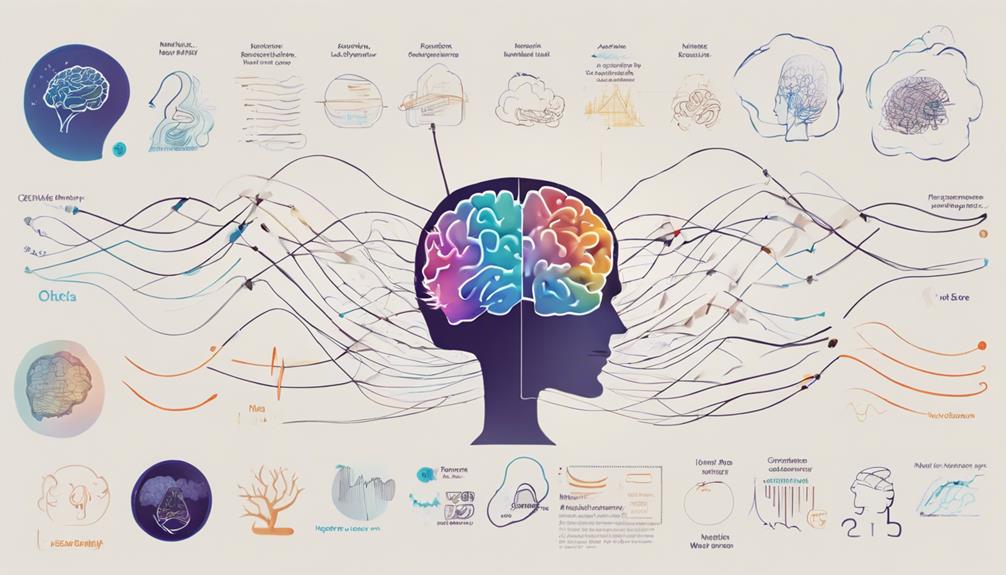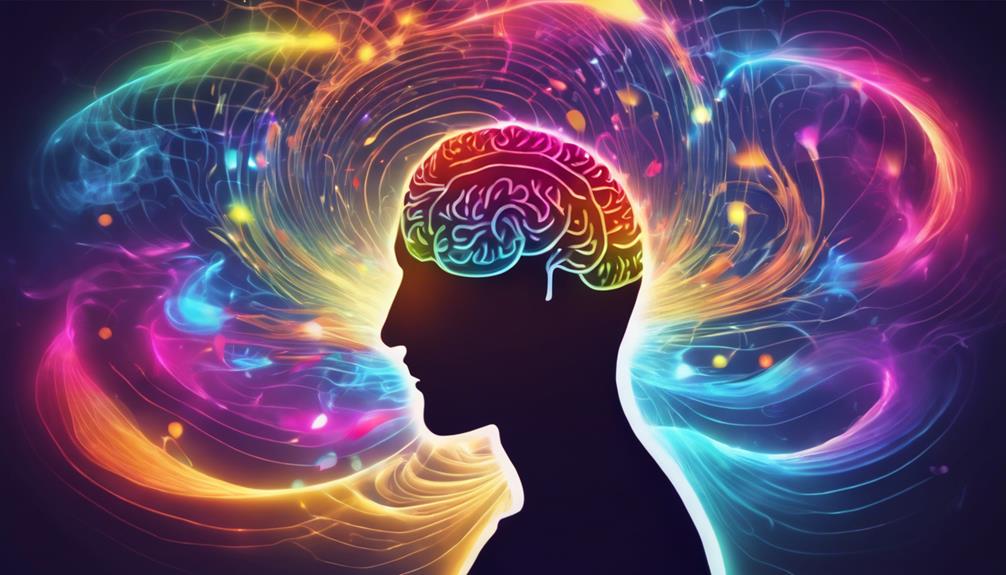Optimizing brain waves with hypnosis involves understanding key patterns such as alpha, theta, beta, and delta waves. Alpha waves induce relaxation and focus, theta waves aid in creativity and problem-solving, beta waves boost cognitive performance, and delta waves support deep sleep. Hypnosis can enhance creativity, focus, and overall well-being by harnessing these brain wave states. Techniques like guided visualization, mindfulness, and deep breathing help induce the desired brain wave patterns. By exploring the interplay between hypnosis and brain waves, individuals can unlock their cognitive potential and achieve improved mental clarity and emotional stability.
Understanding Brain Wave Patterns

Frequently, brain wave patterns are categorized into different frequencies, each associated with specific states of consciousness and cognitive functions. These brain wave frequencies, including beta, alpha, theta, and delta waves, play a crucial role in our mental processes.
Beta waves, ranging from 12 to 38 Hz, are linked to alertness and active thinking. In contrast, alpha waves, with frequencies between 8 and 12 Hz, are associated with relaxation and a calm mind, often induced through meditation techniques.
Theta waves, falling between 4 and 8 Hz, are connected to deep relaxation and creativity, while delta waves, below 4 Hz, are predominant during deep sleep and rejuvenation.
Brain wave entrainment is a technique that aims to synchronize brain wave frequencies with external stimuli, such as sound or light, to achieve specific cognitive functions. By understanding the correlation between brain wave frequencies and cognitive states, individuals can optimize their mental processes through meditation techniques and brain wave entrainment for enhanced focus, relaxation, and creativity.
Benefits of Alpha Wave Induction
Alpha wave induction, through techniques like meditation, offers numerous cognitive and physiological benefits that contribute to overall well-being.
Alpha waves, which oscillate at a frequency of 8 to 12 Hz, are associated with a relaxed yet alert state of mind. By intentionally inducing alpha waves through meditation techniques, individuals can experience reduced stress levels, improved focus, enhanced creativity, and a heightened sense of mental clarity. Research suggests that regular alpha wave stimulation can lead to better memory consolidation and learning abilities.
Moreover, alpha wave benefits extend beyond cognitive enhancements. Physiologically, alpha wave induction has been linked to lowered heart rate, decreased blood pressure, and alleviation of symptoms related to anxiety and depression. These calming effects can promote a sense of tranquility and emotional stability.
Furthermore, the activation of alpha waves is thought to enhance the brain's ability to synchronize its neural networks, leading to improved overall brain function. By harnessing the benefits of alpha wave induction through meditation practices, individuals can optimize their mental and physical well-being.
Harnessing Theta Waves for Relaxation

Theta waves, oscillating at a frequency of 4 to 7 Hz, play a crucial role in inducing a state of deep relaxation and mental rejuvenation. These brain waves are associated with the early stages of sleep, deep meditation, and the subconscious mind. Harnessing theta waves can bring about various benefits such as reduced stress, improved creativity, and enhanced problem-solving abilities.
One of the most popular ways to tap into theta waves is through meditation techniques. By practicing mindfulness and focusing on the present moment, individuals can increase the production of theta waves in the brain, leading to a profound sense of calmness and relaxation.
Meditation techniques like guided visualization, deep breathing exercises, and progressive muscle relaxation can help individuals enter the theta state more effectively. This state is characterized by a sense of deep tranquility and mental clarity, making it an ideal state for stress relief and rejuvenation.
Boosting Creativity With Hypnosis
Enhancing creative potential through the application of hypnosis has shown promising results in stimulating innovative thinking and problem-solving abilities. By utilizing specific hypnosis techniques, individuals can tap into their subconscious mind to enhance their creative flow and boost artistic inspiration.
Hypnosis can help individuals access deeper levels of their subconscious, where creative ideas often reside. Techniques such as guided imagery or suggestion therapy can facilitate a state of heightened focus and relaxation, allowing for a free flow of creative thoughts and ideas. This process can lead to increased artistic inspiration and the ability to think outside the box when faced with challenges.
Moreover, hypnosis can help individuals overcome mental blocks that may hinder their creativity. By addressing limiting beliefs or negative thought patterns stored in the subconscious mind, hypnosis can clear the path for new creative insights to emerge. This renewed mental clarity and openness to innovative ideas can significantly enhance one's creative output and problem-solving skills.
Enhancing Focus Through Beta Waves

Utilizing hypnosis techniques to optimize brain waves for enhancing focus involves entraining beta waves in the brain to promote sustained attention and cognitive performance. Beta waves, ranging from 12 to 30 Hz, are associated with alertness, concentration, and active thinking. Enhancing focus through beta waves can be achieved by employing specific concentration techniques during hypnosis sessions.
By synchronizing the brain to produce more beta waves, individuals may experience heightened levels of focus, resulting in improved productivity and performance in tasks requiring attention to detail.
Beta wave benefits include increased mental alertness, improved problem-solving skills, and enhanced cognitive functions. To optimize brain wave activity for focus enhancement, practitioners often incorporate visualization exercises, positive affirmations, and deep breathing techniques to stimulate beta wave production. These methods aid in sharpening concentration levels and boosting overall cognitive abilities.
The Power of Delta Waves in Sleep
Delta waves, also known as slow-wave sleep, play a crucial role in the restorative functions of deep sleep stages. These brain waves, with a frequency of 0.5 to 4 Hz, are prominent during the deepest levels of non-REM sleep. Delta waves are associated with essential functions such as deep relaxation and the promotion of a dream state.
During delta wave activity, the brain is in a state of profound relaxation, allowing for physical and mental restoration. This deep relaxation is vital for overall well-being, as it enables the body to repair and rejuvenate itself. Additionally, delta waves are linked to the dream state experienced during sleep. Dreams often occur during the REM (Rapid Eye Movement) stage, which is characterized by a mix of delta and theta brain waves.
Understanding the significance of delta waves in sleep is essential for optimizing brain function and overall health. By prioritizing deep, restorative sleep, individuals can harness the power of delta waves to support cognitive function, emotional well-being, and physical health.
Balancing Brain Waves for Optimal Health

An optimal state of health relies on the precise balance of various brain waves to support cognitive function and overall well-being. Brain wave regulation plays a crucial role in maintaining this balance, with different types of brain waves such as delta, theta, alpha, beta, and gamma each serving specific functions.
Meditation techniques have been shown to be effective in regulating brain waves, with practices like mindfulness meditation promoting alpha waves associated with relaxation and focus.
Hypnosis benefits can also aid in balancing brain waves for optimal health. By inducing a state of deep relaxation, hypnosis can help reduce stress and anxiety, leading to a more balanced brain wave pattern. This shift towards a more balanced brain wave state can have positive effects on mental clarity, emotional stability, and overall well-being.
Frequently Asked Questions
Can Hypnosis Help With Memory Improvement?
Hypnosis techniques show promise for memory enhancement. Research suggests that targeted suggestions during hypnosis can improve memory recall and retention. Further studies are needed to explore the full potential of hypnosis in enhancing cognitive functions like memory.
Is It Safe to Listen to Brainwave Entrainment Daily?
Listening to brainwave entrainment daily may have long-term effects on brain function. It's crucial to consult with a healthcare professional before committing to regular use, as individual responses and potential impacts can vary significantly.
Can Hypnosis Sessions Be Customized for Specific Goals?
In the realm of hypnosis, personalizing sessions to cater to specific goals is pivotal for maximizing effectiveness. Research suggests that customized hypnosis sessions have shown higher success rates in achieving desired outcomes compared to generic approaches.
Are There Any Side Effects From Using Brainwave Techniques?
When utilizing brainwave techniques, it is crucial to consider potential risks and long-term effects. While research suggests benefits, individuals should be aware of possible side effects such as headaches, dizziness, and altered cognitive function.
How Long Does It Take to See Results From Brainwave Optimization?
The Brainwave optimization timeline varies depending on individual factors such as frequency of sessions, baseline brainwave patterns, and responsiveness to the technique. Hypnosis effectiveness timelines can range from a few sessions to several weeks for noticeable results.
Conclusion
In conclusion, optimizing brain waves through hypnosis can have various benefits on cognitive function, creativity, relaxation, focus, and overall health.
Understanding the different brain wave patterns, such as alpha, theta, beta, and delta waves, allows for targeted interventions to achieve desired outcomes.
By harnessing the power of hypnosis to manipulate brain waves, individuals can improve their mental well-being and performance in various aspects of life.


